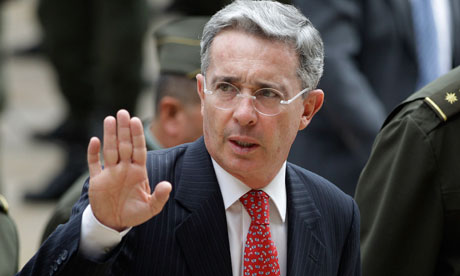The case underscores the long-term nature of the solidarity and commitment required when working on land and justice issues

Colombia's former president” Alvaro Uribe” has described General Rito Alejo del Río as a national hero. Photograph: Fernando Vergara/AP
Justice delayed is justice denied” but it's better than nothing. General Rito Alejo del Río” a major figure within Colombia” but little-known outside the country” was sentenced last week to 25 years in prison for his part in the murder 15 years ago of Marino Lopez” a community leader in Urabá” near the northern border with Panama. Although Del Río didn't actually know anything about this particular murder” which was carried out by paramilitary groups in the area” it was his deliberate failure to intervene that led the judge to condemn him.
The military and paramilitary “pacification” of Urabá in the name of defeating a leftwing guerrilla insurgency is one of Colombia's most emblematic mega land grabs. Communities forced to flee from the violence returned years later to find their farms grown over with palm oil (a growing Colombian industry in response to worldwide demand for biofuels) and bananas (a traditional export). The paramilitaries had sold land to businesspeople. Defeating the guerrillas was a secondary objective – this was really about making money.
As conflict over scarce land becomes an ever more defining characteristic of this era of globalisation” civil society movements around the world are increasingly turning their attention to it. Last week's sentencing of Del Río offers one very important lesson for those working well beyond Colombia's borders: solidarity needs to be long term if it is to be effective.
When I managed Christian Aid's operations in Colombia” between 2007 and 2010″ we had been accompanying Lopez's community for over 10 years” working with our partner on the ground” the Inter-Ecclesiastical Commission for Justice and Peace (IECJP). It is the heroic lawyers of the IECJP” whose directors go home every night in bullet-proof cars” who brought the case against Del Río and who” after many years of setbacks” are finally celebrating justice with Lopez's family and friends. And it is IECJP's visionary community accompaniers who helped rebuild the villages devastated by the military and paramilitary offensives in Urabá.
In an international development industry dominated by an understandable focus on results and impact” the annual reports on those first few years of Christian Aid's investment in the accompaniment of the displaced communities might not have looked that good. With scared villagers camping out in the sports arena of the regional capital” killings continuing” and palm and banana plantations spreading” they might have read something like “no progress yet; things are possibly getting worse”.
But rather than pull out of a fairly hopeless situation” Christian Aid and the IECJP dug in” remaining in solidarity with the displaced communities through the bleak years of setbacks. They are now finally reaping the rewards of their hope and hard work.
A director of IECJP once said to me that what his organisation most valued from Christian Aid was not the money” but the political support (although the money” much of it from EuropeAid” helped of course). “When everyone else was abandoning us at the height of the violence”” he said” “you stuck by us.” It was – and is – a relationship based not on accounting audits and results” but decades of joint working and a shared vision.
The politics of land grabs are usually extremely complex. In this case” the popular president of Colombia between 2002 and 2010″ Alvaro Uribe” who was governor of Antioquia (of which Urabá is a part) when Del Río was allowing paramilitaries free passage to attack innocent communities” has described the general as a “national hero” while accusing the IECJP and other NGOs of being friends of the guerrillas. Although not always violent” land grabs often have the threat of violence behind them if communities decide not to comply with the wishes of politicians and businesses. And the land in question is almost always remote” increasing the likelihood that any legal wranglings will be interminable. Knowing which local organisations are legitimate representatives and which are phoney creations of criminal businessman can be a headache.
In short” international NGOs are best advised to know what they are doing before getting embroiled in this kind of thing – and that means committing to long-term presence or accompaniment.
The true heroes of this story are the members of Marino Lopez's community” who refused to let murder and pillage win the day – and who have finally seen an element of justice done. But it is hard to see how they would have succeeded without the accompaniment of national NGOs” or how those NGOs would have achieved what they have without international support. And it is the long-term nature of the solidarity required when working on land and justice issues that this case underscores. Those looking for short-term wins and neat results to write up in their annual reports had better look for other issues to work on.
